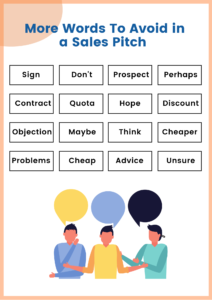Why Rafiki
Pricing


Pricing
Solutions

RevOps Leaders
Synchronize revenue generating functions

SDR Leaders
Get your team aligned and Coach your Reps 3x faster at scale

Sales Leaders
Unlock pipeline truth, drive confident forecasts

A strong sales pitch can mean the difference between closing a difficult prospect and having them slip through your fingers. It’s always a good idea to have your sales pitches perfected before meeting with your potential customers. Your sales pitch is not just a simple talk track, it is a condensed presentation of your thoughts to convince these prospects to buy your product. Good sales pitches can convince even the most hesitant ones.
To make a sales pitch, you have to understand the value your product brings to the customer. A customer isn’t going to buy your product unless you’ve convinced them that your product is going to solve their problems. And that’s exactly where you need to start your pitch creation process.
Always remember this - customers are purchasing your solutions, not your products. They do not want to hear how many advanced features your product has. All they want to hear is what your product can do for them to ease their pain points. If you’re selling a bed, they want to know how it can improve their sleep. If you’re selling an application, they want to know how it can improve their business operations.
More importantly, every sales pitch has to be unique and personalized for a prospect. They are pretty useless if they’re generalized. Look into their verticals, see what problems they are facing, and how your product or service can help solve those problems. Use the information you’ve gathered to customize the pitch to their particular vertical or needs.
Your prospects are always going to be on the fence. It’s the job of your sales pitch to get them to your side of the fence. Make the customer understand what they will lose if they don’t buy your product. Also, make the risks known.
Here are some great examples of a sales pitch that you can templatize and use for your own prospects. The templates can be used for both emails as well as telephonic conversations -
This template can be adapted to any online medium. Use the problems your prospect has to your advantage. Do the prior research needed to understand what your customer is looking for. Then build the pitch in such a way that you first talk about the problem and then solve it for them with your product.
Here is a handy template -
Salesperson: Hey Marshall!
Prospect: Hey, how are you doing?
Salesperson:
Doing great! Thank you!
I understand that you are having trouble understanding what’s going on with most of your sales accounts.
Prospect: Yea, that’s true
Salesperson: In that case, you should try using Rafiki.
Our Deal Desk feature gives you a clear picture of what is going on in your accounts.
You get to know how your reps are handling the objections, whether are they engaging with stakeholders at the senior levels, and whether are they having the right discussions.
One of the best sales pitch examples comes from knowing your prospect beforehand. People are more likely to trust people they’ve spoken to before. Whether this is through email or phone, by bringing up an old conversation, your prospect will be more than willing to listen to what you have to say.
Here is an interesting pitch idea -
Salesperson: Hey Rachel
Prospect: Hello, Who’s this?
Salesperson: Remember me? We met last week at the Gartner Tech Event.
Prospect: Oh yea, I remember chatting with you after the event.
Salesperson:
Yes. We had a really animated conversation about how things are going on at your workplace.
In fact, I vividly remember you mentioning your team having difficulty organizing meetings and recording them.
Did you know I faced a very similar challenge in my previous organization?
Prospect: Oh is it? It’s pretty frustrating.
Salesperson: Absolutely, no one better than me can understand the pain.
But now at Rafiki, I help teams breeze through their calls by automatically scheduling calls, recording those calls, and transcribing them to capture interesting insights.
I think I can help produce very similar results for your organization as well.
Although we said you’re here to deliver a solution, sometimes the best sales pitch starts with a question. A good question makes your prospect think about their problems and how your solution can alleviate that problems. Here are some interesting questions you can start with -
Customers don’t want to know what features your solution has. They want to know what benefits it can give to them. Benefits can be experienced but features only serve to fill out a spec sheet.
Here is a simple example -
Salesperson: Hey Adam
Prospect: Hello
Salesperson: I am calling from Rafiki and we help sales teams extract valuable insights from their calls and help them improve conversions.
Prospect: Ok...
Salesperson: I know that your team regularly uses Zoom meetings for all their sales conversations.
Do you think it would be nice if a tool could connect with Zoom, record all your conversations, transcribe them and throw some interesting insights at you about how a deal is shaping up?
Prospect: Yes, it will be pretty useful.
Salesperson: Well, Rafiki could do that for you...
In the above conversation, we haven’t mentioned how Rafiki seamlessly integrates with Zoom. Instead, we have talked about how the integration helps their cause.
If you’re wondering how to make a perfect sales pitch for your prospects, know that data could be your trump card. For example, If you are promising improved insights into customer behavior using Rafiki, identify what kind of data you can have to back it up. Remember - The numbers will sell the tool by themselves. Here is an interesting conversation pattern you can try -
Salesperson: Hey Ronald
Prospect: Hi, How may I help you?
Salesperson: I am calling from Rafiki, we help sales teams extract valuable insights from their calls and help them improve conversions.
Prospect: I see...
Salesperson: Did you know that continuous training gives you 50% higher net sales per employee?
Prospect: Is it? Could you shed some more light on that?
Salesperson: Absolutely...I would love to...
People love hearing stories, whether they’re real or not. If you’ve got a customer who’s willing to give you the time to tell a story, using a storytelling pitch can help not just sell your product, but can go a long way in terms of customer retention.
Salesperson: Hey Liu,
Prospect: Hello
Salesperson: I am calling from Rafiki and we are a conversational intelligence platform that helps improve conversions for the sales team.
Prospect: Ok...
Salesperson: Just a little curious. Are you from Yunan
Prospect: Yes. That’s where I am from.
Salesperson: That’s awesome. I was in Yunan for a year. It’s an amazing place. Once I was working as a sales rep for a glove manufacturing company when……
The best sales pitch is often not formal at all. You’re not trying to impress your boss, you’re trying to convince another human being. A conversational tone through email or phone can help make you seem that much more human. You’ll seem warmer, and more friendly, and prospects will be encouraged to like you. Here is an interesting conversation -
Prospect: So, what do you do at Rafiki?
Salesperson: I build ropes for our clients
Prospect: Huh? What does that mean?
In sales, you’re often going to be met with rejection. Voicemail pitches are based on the fact that sometimes, the prospect doesn’t want to talk. Leaving a voicemail by establishing your identity, where you’re coming from, and what you want to talk about will help them get accustomed to you before they finally make the purchase.
Salesperson:
Hey Anne
This is George from Rafiki
It’s really unfortunate that I couldn’t talk to you personally about how our product can help ramp up your sales team’s productivity in no time.
Do reach me back if you think you really need help regarding this
Name dropping, or letting your prospect know that you know their contacts or friends, is an excellent technique that tells your prospect that they’re dealing with someone their friends, family, and colleagues already know. Using this can breed familiarity and ease the sales process.
Salesperson:
Hey Julian
I am a close friend of your colleague Nicholson...
We worked together at Siemens…
Prospect: I see...How is Nicholson doing now?
Very few people trust salespeople, and that's no fault of the buyers or the salespeople. Social proof is when you use the public to validate your claims and convince your prospects. Testimonials, reviews, and third-party opinions can be great sales tools.
Salesperson: Hey Katie
Prospect: Hi
Salesperson: I am calling from Rafiki, a platform that can help ramp up your sales team’s productivity in no time.
Prospect: Ok...
Salesperson: Did you know that Barbara, the CEO of Genpact had a lot of nice things to say about us?
Prospect: Oh is it?
Salesperson: Yea! She even spoke about it in her interview with Saasclub? Can I share with you the link to that podcast?
So far, we’ve seen what to say in a sales pitch. But there are some no-nos you should avoid in every sales pitch you write.
These words are used by salespeople when they don’t have any confidence in what they’re saying, or they have no proof to back up their claims about their product.

This might sound weird, but using “buy” is a surefire way to encourage prospects to not buy your product. Instead, use “Own” or “take-home”
Anything that has “honest” in it is a huge no-no, it just implies that everything you said before that point are lie.
People don’t like the word cheap, even when it’s value-oriented. By referring to your product as cheap, prospects are less inclined to purchase your product. Use words like “Value” or “competitive” to make your point understood.
Using this is a great way to lose a prospect. They know why they haven’t reached back from you. They don’t want to talk to you, and using this phrase just reminds them of that fact.
Avoid using these words and phrases, whether you’re selling through the phone, email, or even chat. Prospects usually become dead ends when you use them.
Sales pitches have been a part of most businesses since time immemorial. Learning how to create a sales pitch and use it effectively is a great way to crack even the toughest of prospects. If you want to know more about how to manage your sales process, or how to bring out the A-game of your sales team, check out some of our other blogs.
Or if you think you need additional insights to help prepare your sales pitch for your next sales call, get started right away with Rafiki. Rafiki helps you track what topics your reps and customers are talking about using the latest AI technology. It parses your customer conversations and offers you rich topical insights to help you frame the perfect pitch that can convince any prospect.